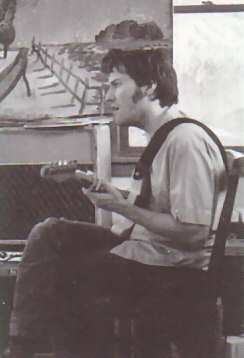DAVE'S DIARY - 10 OCTOBER 2004 - GILLIAN WELCH
THE LIFE OF BRIAN, GILLIAN AND DAVID
"I am an orphan on God's highway/ but I'll share my troubles if you go my way." - Orphan Girl - Gillian Welch.
 |
Sydney roots
music promoter Brian Taranto - mine host for tours by artists diverse
as singing Texan crime novelist Kinky Friedman and Louisiana legend Tony
Joe White - has struck gold.
Taranto earned the admiration and envy of rival promoters with his mix
of urban and rural gigs for Gillian Welch and David Rawlings.
But not even tight rope walker Taranto was expecting to sell out the Gippsland
gig at Meeniyan and spa country concert at Hepburn Springs within hours
of going on sale.
Well, actually the accompanying accommodation was snapped up well in advance
of the ticket sales.
With cyber chat room chatter dating back to autumn there was an air of
not so hushed expectancy all through the long wet welcome winter.
So when the concert press release from Byron Bay publicist Kylie White
lobbed at the community radio and the print media outlets the cyber chatter
clucked into over drive.
The 280 seat Meeniyan and 320 seat Hepburn Springs Palais venues fell
faster than a Saddam statue.
City slickers wanted to be seated into the comfort of the rural rump rather
than stand in the St Kilda colossus Prince Of Wales.
This left locals with a big decision - if they missed out on tickets they
had to travel to the big smoke.
Well, the first two shows at the POW, owned by a pair of Warrnambool born
brothers and families, sold out promptly so a third was added.
Now, if that sells Brian could give insatiable city fans alternate gigs
in the backblocks of The Otways, the Harrietville high country or for
those with modest petrol budgets the You Yangs, just off Highway One en
route to the home of the greatest team of all.
And down at Meeniyan, the buffs could arise at 5 a m and apply the teat
cups to the Friesians, always wired and inspired for their first spring
milking of the day.
The tour begins at Brisbane Tivoli on November 1 - Melbourne Cup Eve -
and ends at
Meeniyan Hall on November 14.
CLICK HERE for full dates in the
Gig Guide.
NO SHOCK FOR SHOCK
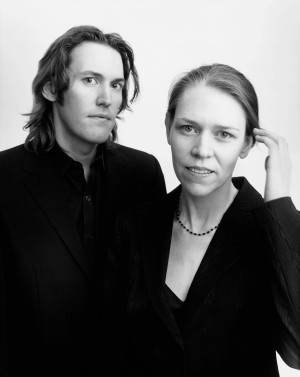 |
The
concert sales reaction is good news for Taranto - his publicity budget
is trimmed with no need for advance interviews. So is the duo's backstage rider. Welch brings her own tea bags. Brian might need to stock up on kettles with strong elements, especially for rural gigs exposed to the elements. It's too late to reincarnate The Singing Kettles - the mountain reared duo from outside of Scottsdale in the wild north east of Van Diemen's Land. This is good and bad news for the duo's local record label Shock. Interviews are likely to be less frequent and later. < David Rawlings & Gillian Welch |
So, as a
courtesy to Nu Country viewers and readers, we will fill in a few of the
gaps with some personal background on the combatants.
Welch and Rawlings first won exposure here on community radio - specifically
Nu Country - when artists diverse as Kathy Mattea, Emmylou Harris, Trisha
Yearwood, Cyndi Boste and Tim & Mollie O'Brien covered their songs.
Those artists spoke of their discovery of their music when Welch drove
around Guitar Town in a pick-up truck, loaded with their demo tapes.
"It was a 1966 F-100 with a 352 motor, three on the tree, and an
eight-foot bed," Welch recalled, "you could put a whole sheet
of plywood in it."
Rawlings spent all the money he had come to town with on his pick-up -
a farm truck from an orange grove in California and inherited by someone
in Nashville.
The California sun dissolved the finish, so the truck is several colours,
mainly orange, green, and grey.
"It looks as if it were covered with lichen." Welch said.
This was long before the famed Coen Brothers O Brother movie and T Bone
Burnette soundtrack ignited sales charts with minimal mainstream airplay.
That story has been told many times.
And, of course, the embryo of duo discs Revival (1996), Hell Among The
Yearlings (1998), Time The Revelator (2001) and Soul Journey (2003).
So here's some personal info to fill in the dots.
RAWLINGS
ROOTS
|
Rawlings
was raised in Slatersville, Rhode Island - a former mill town with
a river. The mills were textile mills, built on the riverbanks,
and they had been allowed to become dilapidated. "That way, we could learn to play and perform at the school talent show, in May." Rawlings asked a kid who was known as a guitar player for help, and then the boy's father, who had taught guitar. Rawlings noticed that playing guitar "was something I was immediately passable at, or maybe even good at. Which wasn't the case with things such as basketball, which I tried really, really hard at, but it wasn't going to happen. |
David Rawlings |
Music, because
it was math-based, and I was good at math, I wasn't intimidated."
He and his friend learned Heart of Gold, by Neil Young. They came in second
at the talent show, and the next year they won.
GILLIAN AND MINDY
"My
mother was just a girl seventeen/ and my dad was passing through, doing
things a man will do." - No One Knows My Name - Gillian Welch-David
Rawlings.
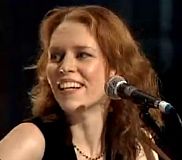 |
Gillian
Welch, like latter day country folkie Mindy Smith, is a New York born
orphan raised by creative, caring adoptive parents. And, like Smith who debuted with her version of Jolene on Dolly Parton tribute disc Just Because I'm A Woman, she lets her songs speak for her. No One Knows My Name is about her birth parents. |
Her mother
was a college student in New York, and her father was a musician. By the
time she was delivered, her adoption had been arranged.
Gillian was born in New York in 1967.
Welch's parents
claimed her the day after she was born, and, honouring rules imposed on
the adoption, they sent a friend to the hospital to collect her.
Over the years, they have learned two things about Welch's mother and
father, which they told Welch while she was visiting last Christmas.
Her father was not from the South, so far as they knew, but he was a musician;
in fact, he was a drummer.
And, from an address they had been given, it appeared that her mother,
the college student in New York, may have grown up in the mountains of
North Carolina.
Ken and Mitzie Welch already had a daughter, Julie, who'd been born in
1961.
She and Welch are close, a graphic designer living in California and also
teaching improvisational comedy.
Julie's birth was difficult, and Mitzie wasn't eager to go through another
pregnancy.
According to Welch, when they approached adoption agencies "the agencies
said no dice because they were entertainers."
Ken Welch had been a performer since childhood, in Kansas.
He had begun piano lessons at four, but the teacher soon told his parents
she couldn't do more with him until his hands were large enough to span
an octave.
"I couldn't reach an octave on a piano, but I could on an accordion,"
he says.
By the time he was seven, he was tap dancing and playing the accordion
throughout "Missouri, Kansas, and Iowa, the remains of the old RKO
circuit," he says.
Eventually, he attended Carnegie Tech, now Carnegie Mellon, in Pittsburgh,
where he studied painting. He met Mitzie at an audition.
FROM
KANSAS TO NEW YORK
They moved to New York separately. She sold handbags at a store on Broadway,
and made twenty-five dollars on Sundays singing in the choir at Norman
Vincent Peale's church.
She auditioned for Benny Goodman and got the job, but she had only a few
weeks in which to learn Goodman's repertoire. She ended up writing lyrics
on the palms of her hands and on her fingernails.
As the comedy team Ken and Mitzie Welch, they appeared in clubs where
Lenny Bruce also performed. Bob Newhart was once their opening act. They
had their most public success on the Tonight Show, when Jack Paar was
the host.
They performed a slowed-down version of I Got Rhythm. Mitzie faced
the audience and sang, and Ken stood with his back against hers, playing
the accordion.
By the time the Welches adopted Gillian, with the help of their doctor,
Ken was writing music for television shows, and Mitzie was working in
commercials and on Broadway.
When Welch was three, her parents moved to Los Angeles, to write music
for Carol Burnett Show.
As a little girl, Welch came home from school one day weeping because
she had been reprimanded in art class for making a black outline around
snow.
CARTER
FAMILY
At Westland, the students gathered every week to sing folk songs and Carter
Family songs, with Welch accompanying them on guitar.
"On the tapes from the period, she sounds the same as she does now,
except that her voice is higher," Rawlings said.
Welch's parents bought songbooks for her, and, sitting by herself in her
room, playing guitar, she made her way through them.
When she got to the end she wrote songs of her own, "about ducks
and things," David said.
"Like a kid who writes poems, and they go in a drawer."
Welch attended a high school called Crossroads, "where I get way
into ceramics and art and stay hours after school building things and
they let me," she said.
"And I run like crazy - cross-country and track."
Welch made the all-state team for the mile and was invited to run in the
national trials.
"But if I'd gone I'd have got my ass kicked," she said.
"They were in Texas, and I didn't do well in hot weather. Really,
my sport was cross-country. I discovered the longer the race, the more
I moved up in the field. I don't run that fast - I just go, very rhythmic.
I'm endurance."
Welch said that her favourite English teacher had gone to Princeton, so
she applied, without telling him. But when he heard that she'd been accepted
he told her that she wouldn't be happy there, and she went to the University
of California at Santa Cruz
BERKLEE
COLLEGE
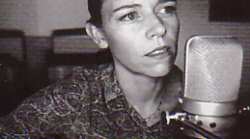 |
In
1990, a friend of Welch's parents wrote a recommendation for her to
the Berklee College of Music, in Boston. It was the same college where famed West Texas panhandle producer and musician Lloyd Maines sent his youngest daughter Natalie en route to her role as singer for superstar trio the Dixie Chicks. |
"Her
parents make the situation happen. But on the other hand it's in Boston,
so they don't have that much control," Rawlings said.
"All right. So Gill goes to Boston, and of course she's useless at
Berklee."
"It's a jazz school."
"And she's a primitive."
"I felt like a Martian," she said. "I'm out of my peer
group. I have no friends. I'm in my room listening to brother-team music."
"One of her teachers looks at the way she makes a C chord and says,
'If you keep doing that you'll be a cripple in a few years.' But she stays
for two years and majors in songwriting, and the songwriting program is
just starting to flower."
Welch and Rawlings began going out with each other at Berklee.
They met in a hallway, while waiting to audition for the country-band
class.
At Berklee, Welch overcame her shyness about performing, she said, "because
you had to. In every class, you had to do things in front of about twenty
people."
STEAM IRON IN GUITAR TOWN
When school
was over, Welch said, "I looked at my record collection and saw that
all the music I loved had been made in Nashville - Bill Monroe, Dylan,
Stanley Brothers, Neil Young - so I moved there. Not ever thinking I was
thirty years too late."
For a while, Welch made beds and cleaned bathrooms at a bed-and-breakfast.
"That was a good job for me," she said.
"You can't listen to the stereo, because you're moving from one room
to another, and the vacuum is too loud; there's no entertainment, so you
have to provide it. I would write. Plus, I had a forty-minute drive there
and back, and I have always been able to write when I'm driving, if I'm
by myself." She brought home tablecloths and napkins to iron. She
and Rawlings lived in the same apartment building, and sometimes, if Rawlings
needed money, he did some ironing, too.
PUBLISHING
DEAL
In 1994, Welch signed a publishing deal, and then devoted herself to trying
to get a record contract.
Her publisher sent tapes of her and Rawlings to Jerry Moss, at Almo Sounds,
in Los Angeles, and in 1995 her manager Denise Stiff - also manager of
Alison Krauss - went to L.A. to see him.
Welch played for him in his office. Behind his desk, Moss began quietly
singing harmony with her. When Stiff heard him, she thought, Those are
David's parts. Jerry's heard them on the tapes, and if he's singing them
he's missing them.
She never again felt uncertain about Rawlings's role.
Even so, once Welch and Rawlings were signed to a recording contract the
question they heard most often was "Who are you going to get to play
guitar on your record?"
WRITER'S NIGHTS
Welch and
Rawlings swung from the ropes on the creative and highly competitive writer's
night circuit in Nashville.
"How you'd find them is look in the paper," she said. "If
it wasn't a highbrow place, the ad simply said 'Writer's Night,' and if
it was a highbrow place you'd see the names of all the writers booked.
"One night, I walked around with the cigar box collecting the money,
because there was no one at the door, which says something about how determined
I was - do you think our show was worth the money?"
At the end of a side street was a small, two-story brick building with
a little sign that said Pub of Love.
"Tuesday nights," Welch said. "Probably forty people."
Down by the river, near the Ryman Auditorium, where the Grand Ole Opry
was the Silver Dollar Saloon.
"One time I came down here to a writer's night by myself," Welch
said.
"November '93. Dave has travelled back to New England for Thanksgiving,
and I'm here by myself. This night, I'm late, and the guy grudgingly puts
me on the list.
'We've got a lot of people,' he says. He works his way through the writers.
I'm waiting. The crowd's thinning out. Once the writers play, they leave,
and whoever came to see them, their friends, they leave, too. Finally,
it gets to be about eleven-thirty, maybe coming up to midnight. The bartender
and me are left. The guy says to me, as he's leaving, 'Will you turn off
the sound system when you're done?'
"Most of the things that might have been discouraging have their
pathetic and funny sides, too," Welch said. "Usually, it was
all right. No one kicked me out. They would listen, but they would always
say, 'Don't you have any happy love songs?'"
BLUEBIRD CAFÉ
| Welch
fondly recalled her days at the famed Green Hills venue Bluebird Café
- locale for the movie Thing Called Love in which Pam Tillis,
Trisha Yearwood, Kevin Welch and Dale Watson had cameo roles. "We're heading for the Bluebird Café, where you'll laugh when you see it, because it's in a strip mall," Welch said. |
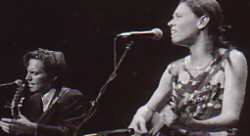 |
"The Bluebird was very important in our coming-up," Welch said. "It was the scene of where I got signed for my writing deal, actually."
She moved
a step to the side and pointed. "Right there," she said. "Over
by the cigarette machine."
Welch is bemused by controversy of being daughter of musicians in Los
Angeles and claims she has no right to play music regarded as reserved
for people who grew up in poverty or, anyway, among labourers.
Welch's narratives are accounts of resignation, misfortune, or torment.
Her characters include itinerant labourers, solitary wanderers, misfits,
poor people plagued at every turn by trouble, repentant figures, outlaws,
criminals, soldiers, a moonshiner, a farm girl, a reckless beauty queen,
a love-wrecked woman, a drug addict, and a child.
She is sympathetic to outcasts who appeal to God despite knowing from
experience that there isn't likely to be any. Their theology is ardent
and literal. They are given to picturing themselves meeting their families
in Heaven, where mysteries too deep to comprehend will finally be explained.
HEMINGWAY
Rawlings
compares Welch to Ernest Hemingway.
"You read The Old Man and the Sea, and you like it," he says.
"Then you find out that not only is the man who wrote it not a commercial
fisherman, he isn't even a Cuban. Do you not like it now?"
Welch says that the first time she heard bluegrass music she felt stirred
as she never had by any other music. She has said that it makes no sense
that she plays relic music deeply influenced by a part of the country
she did not live in until she was grown. More than a few of her songs
have the harsh modal structure of the ballads sung in the mountains of
North Carolina in the nineteenth century.
Her reaction reflects having sung folk songs as a girl and played the
guitar at school, and a pleasure that surfaced when she was reminded of
it - a sense memory, that is.
In any case, to explain the anomaly posed by the difference between her
upbringing and her tastes she has told interviewers, somewhat sheepishly,
that she has wondered whose blood runs through her veins.
She has even considered which musicians might have passed through New
York in 1967.
She has imagined her father as Bill Monroe or Levon Helm, the drummer
in the Band, who was from Arkansas.
After all, the first instrument she played was the drums, and now and
then she still plays them.
LOSE THE GUITAR PLAYER
Welch decided
that if she wanted a career as a songwriter she would have to make the
weekly rounds of songwriters' nights at the clubs.
Rawlings was working with other musicians, but he agreed to go with her.
"Just sort of to accompany me because you have to sit there and wait,
and it's not a good time," she said.
When they began arranging her songs, they realised that, "instead
of the Stanley Brothers or the Blue Sky Boys, or any of the brother acts
we've listened to - lead singers and a tenor - we have a difference,"
Welch said.
"We have a lead singer and a baritone singer."
Because Welch was intent on establishing herself as a songwriter, and
because their arrangement began informally, and Rawlings was playing with
other people anyway, she says it didn't occur to them to name the duet;
they performed simply as Gillian Welch.
Almost from the start, people tried to separate them. After about a year,
Welch found a manager, Denise Stiff.
"I must have had a hundred people say to me, 'Lose the guitar player,'"
Stiff said. Rawlings draws too much attention from Welch, they said. Or,
he plays twenty notes where ten will do. Or, with a band behind her she
could be the next Alison Krauss
FENDER ESQUIRE
In 1997,
Rawlings bought a Fender Esquire, an electric guitar, and wanted to use
it, so he and Welch got a friend to play drums, and Welch played the electric
bass and they began playing clubs as the Esquires.
They never announced their performances, and not many people came.
They played songs by Neil Young and the Rolling Stones and others and
Rawlings sang most of them.
The Esquires brought to their gigs a complete book of Dylan songs, and
once during each evening the audience was allowed to shout out a number.
Welch and Rawlings picked one, then turned to the corresponding page in
the Dylan book and played whatever song was on that page. Rawlings says
that, for the most part, their playing was "a two on a scale of ten."
They last played in 2002.
"The Esquires' big gig was New Year's, because no one would ever
hire me and Dave to play New Year's," Welch said. "So we were
always free."
